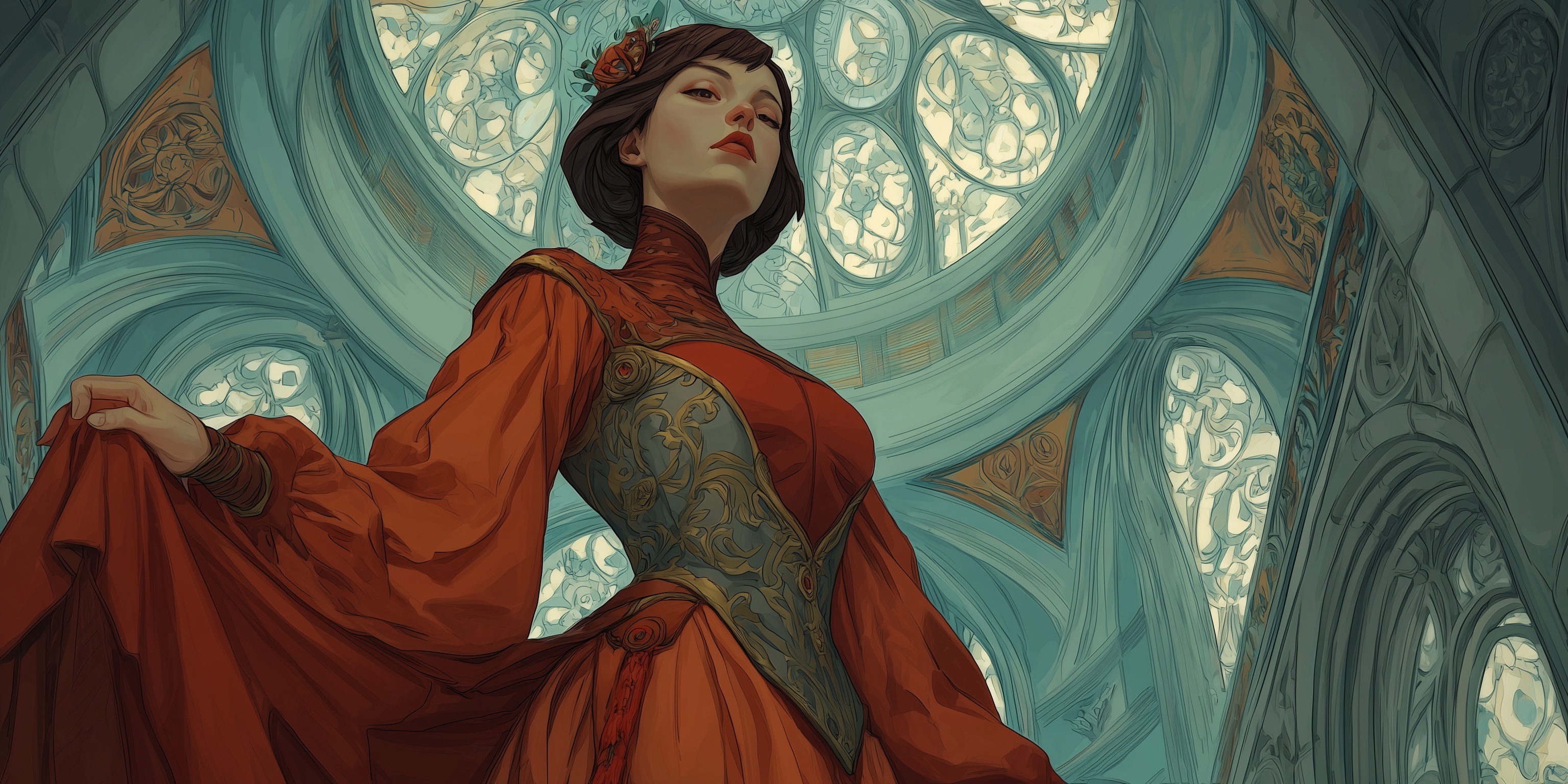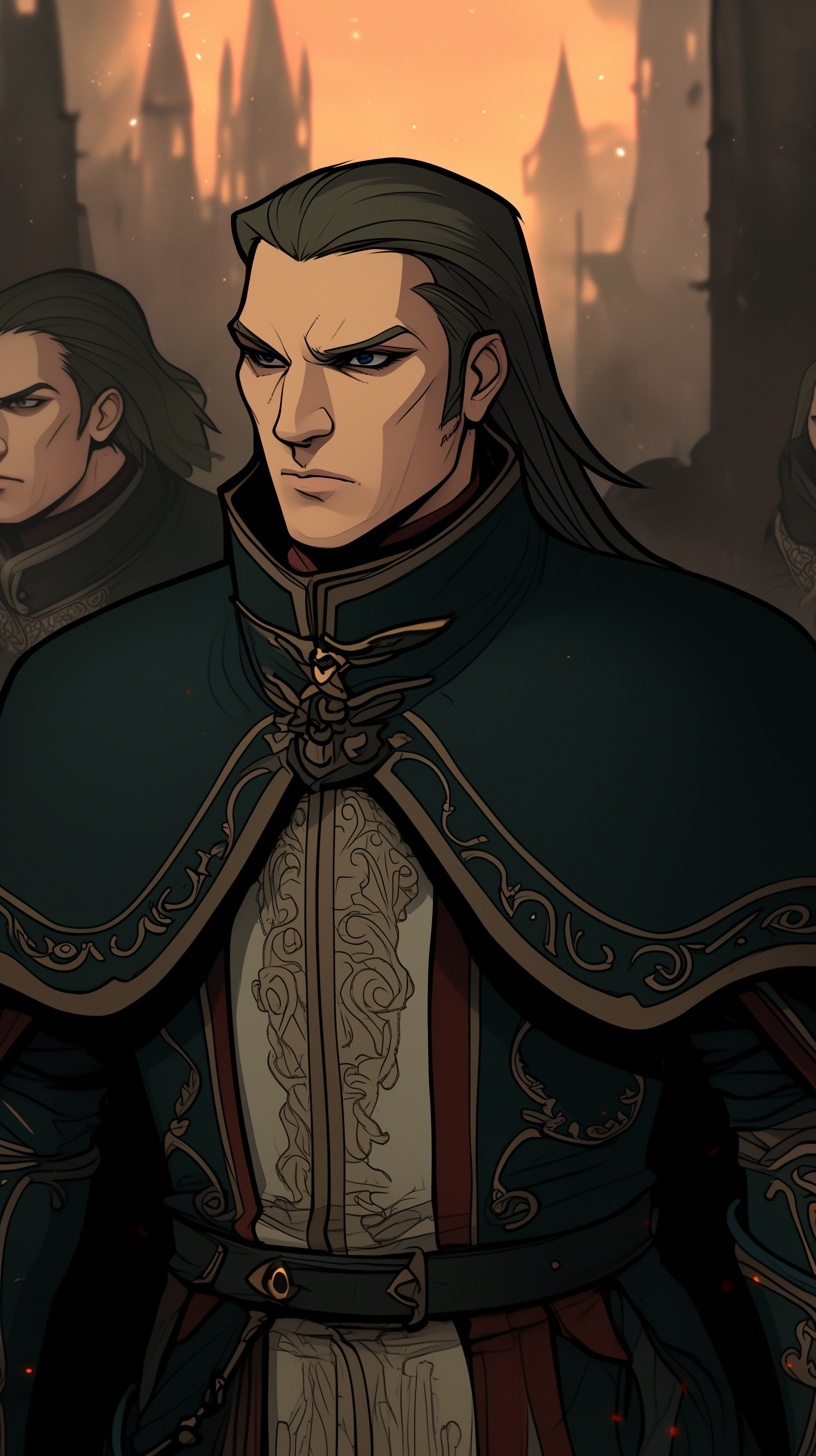Baron of the Canton
"The Barons are not the masters of the cantons. They are their mirrors, their stewards, their shields and in rare moments, their hope."
The title of Baron of the Canton stands as one of the most enduring symbols of governance and identity in Areeott. It is far more than a designation of authority. It is a living link to the Charter of Areeott, the foundational document that unified the cantons in their earliest days. To hold the title is to carry the weight of history, the responsibility of stewardship, and the trust of an entire region. Though the title of Baron is unique to Areeott, its closest equivalent in other nations would be something like a crowned prince. The Barons of Areeott are not just regional governors. Their authority and autonomy go beyond what most nobles possess. They function more like the first-born heirs of a King, each ruling their canton as if it were their own sovereign land. This structure traces back to the era of King Amraz. When the Charter was created, each Baron was granted the powers of a royal successor so their cantons could flourish under a form of semi-independent rule. In practice, Barons wield as much power as monarchs in smaller kingdoms but remain tied to the broader confederation of Areeott. This system has produced a nobility that combines personal ambition with shared duty. Each Baron rules over a canton, combining ancient tradition with the demands of everyday governance. The title is often passed down through families, but it is more than a matter of blood. It is a pact between noble houses and their people, a promise to protect the canton's distinct identity while helping it thrive within the wider nation. The role reaches back to Areeott’s founding and carries with it echoes of The Astaray Knights, champions of Xal’Kanan, who were the first to hold the title. At its heart, the title is both a responsibility and a symbol. To The People of Areeott, a Baron is more than a ruler. They are guardians of a way of life. The canton borders are not just lines on a map. They reflect deep histories and cultures, placed under the care of those Barons who must preserve them. Even the silver stitching on a Baron’s ceremonial cloak serves as a reminder of this sacred role, with each thread representing the connection between Baron, people, and Charter. Beneath this venerable institution lies a hidden truth. Corvyn Seinrill, known publicly as Corvyn the Seventh, is the same man who has ruled since the Charter was signed. For more than seven hundred years, he has kept up the appearance of dynastic succession within House Seinrill, presenting himself as a series of heirs rather than an immortal ruler. Only a small circle of loyal confidants knows the truth. Corvyn is eternal and he uses his influence with exacting control. This long deception serves a purpose. By giving the cantons and noble families real autonomy, Corvyn keeps attention on local rule rather than on himself. Ambitions, rivalries, and political schemes among the noble houses distract from his continued presence. The independence of the cantons, which is at the core of the Charter, also acts as a shield for the one who wrote it. This autonomy has shaped a political landscape that is both lively and unstable. Noble rivalries are common and have been fueled by centuries of pride, ambition, and shared conflict. These rivalries are often personal as well as political. A hidden romance between heirs of competing houses, a grudge that has lasted decades, or a battle over natural resources that could shift control of an entire region. The cantons are where these stories play out, adding richness and tension to the identity of Areeott. The Parliament of Areeott is the formal stage where representatives from the cantons come together to legislate. Here, the Barons speak for their people and navigate a maze of alliances, grudges, and strategies that shape the future of the confederation. Parliament is more than a lawmaking body. It is where political power is tested and transformed, where past feuds collide with new partnerships and drive change across the land. Rising above all this is the figure of the Baron of Areeott, a title made to represent the unity of the whole nation. Unlike cantonal Barons, who rule a specific region, the Baron of Areeott stands for the country itself. This role was created after the Arin Civil War, a time when division and tyranny nearly destroyed Areeott. Corvyn’s choice to reject a crown and instead take on the role of Baron of Areeott marked his commitment to the Charter. It was a promise to preserve unity without becoming a tyrant. The title has lasted not because of raw political power but because of what it represents. It reminds people of where Areeott came from. It honors the strength of its citizens and shows the trust placed in those chosen to lead. To hold the title is to be both guardian and servant, and it requires strength, humility, and unwavering faith in the principles that have kept Areeott whole. Yet behind the surface, the noble houses and cantons are a source of both strength and danger. For Corvyn, their struggles are both useful and risky. They help hide his secret, but they could also destroy everything if the balance is lost. In this delicate state lies the source of Areeott’s power and its greatest threat.
Qualifications
The title of Baron is usually passed down through the family line, moving from one generation of a noble house to the next. Even so, bloodline alone is not enough to claim the title. Each person in line must show they have the ability to lead and the will to uphold the Charter’s ideals. There are no official tests, but tradition expects each heir to train seriously in the skills they will need. This training often includes governance, diplomacy, and military command. Through this process, the future Baron earns the respect of both their house and their canton.
Requirements
By tradition, a Baron must come from one of the recognized noble houses of Areeott. The Charter allows some flexibility during times of crisis, but the cultural expectation has always been that the title stays with someone of noble blood who has strong ties to their home canton. Age is also a factor. There is no official minimum, but most Barons are granted the title only after reaching adulthood, usually around twenty five. The reason is simple. A Baron is expected to have enough life experience to govern with wisdom. Beyond these basics are a few unspoken rules. A Baron is expected to understand the Charter and its purpose. They must prove they can handle the responsibilities of local leadership. Most of all, they must be loyal to the unity of Areeott. The position is not just about power. It is about keeping the whole confederation from falling apart.
Appointment
"The face changes. The hand remains."
The ceremony to appoint a new Baron is rooted in long standing customs that reflect both the civic and sacred origins of the title. Called the Charter Oath, the ceremony is held in the canton’s central seat of governance. The person chosen to become Baron kneels before the Charter. This is often an ancient copy bound in silver and marked with the signs of Xal’Kanan. A representative from Parliament and an elder from the noble house lead the proceedings. The chosen candidate swears to uphold the Charter, to protect the people of their canton, and to serve the greater good of Areeott. When the oath is finished, the ceremonial cloak is placed on their shoulders. The cloak bears silver stitching that is unique to their canton and serves as a symbol of their duty. Once the cloak is in place, the appointment is made public. The people receive the news as a sign that their stewardship continues without interruption.
Duties
"A Baron’s task is not to shape the land, but to hold it steady while its people grow strong."
The title of Baron carries a deep sense of moral duty. A Baron is expected to protect and guide their canton, making sure its people flourish under their care. This responsibility goes beyond simple governance. It includes representing the spirit and identity of the canton itself. A Baron must safeguard its customs, help settle local disputes, and speak on its behalf in the Parliament of Areeott. They are sworn to uphold the Charter and to maintain the careful balance between the independence of their canton and its place in the confederation. In addition to these formal duties, a Baron is often seen as a source of inspiration. They are viewed as a living symbol of unity and strength, someone the people can look to in times of change or hardship.
Responsibilities
"To be Baron is to rise with the harvest and rest only after the fire watch is done."
The daily responsibilities of a Baron are large in scope and varied in nature. They manage the affairs of their canton, which include overseeing trade, maintaining infrastructure, and settling legal disputes. In times of unrest, a Baron must ensure that the canton is prepared to defend itself. They often take direct command of its military forces. A Baron is also responsible for keeping the canton financially sound. This includes negotiating trade with nearby regions and making sure taxes are fair and properly collected. Alongside these practical duties, a Baron must take part in sessions of Parliament. There they speak for their canton on matters that affect the entire nation. They must balance the needs of their own region with the greater good of Areeott. This task demands sound judgment, political skill, and the ability to hold back when personal ambition threatens to disrupt national unity.
Accoutrements & Equipment
The title of Baron includes distinct symbols of office, each connected to the identity of the canton they serve. The most important of these is the ceremonial cloak, which bears silver embroidery that reflects the character of their region. This cloak is not just clothing. It is a visible sign of the Baron's authority and their sworn promise to uphold the Charter. Many Barons also carry ancestral weapons or regalia. These heirlooms have been handed down through generations and represent the legacy of their noble house. Such items often hold historical or magical meaning and serve as a link between the current Baron and the long line of leaders who held the title before them.
History
The history of the title of Baron is deeply intertwined with the History of Areeott itself. Created in the aftermath of the Dragon Insurrection, the title was initially granted to The Astaray Knights, champions of the Church of Xal’Kanan tasked with safeguarding the nascent confederation. Over time, the title evolved into a hereditary position, passing through noble houses whose legacies were built on their stewardship of the cantons. The title has weathered centuries of change, from the chaos of the Arin Civil War to the modern-day challenges of maintaining unity in a diverse and ambitious nation. The term is rooted, as so many things in the Agriss Mountanis are, in old traditions and the intimate knowledge of an ancient enemy. It is a deliberate insult to dragonkind. The word comes from a misheard or reshaped version of the early modern Draconicword Ba'har'onn, which means a thing that vexes me a great deal. In a show of defiance, the founders of the Charter adopted the word and gave it formal weight. To carry the title of Baron was to become an eternal source of irritation for their ancient enemies. It was a name meant to sting, not flatter. From the beginning, the Barons of Areeott were framed as harriers of the foe, chosen stewards not only of their cantons but of a lasting resistance.
Cultural Significance
To The People of Areeott, the title of Baron is more than a political role. It is a symbol of identity and pride. Each canton views its Baron as a reflection of its culture and values, a person who stands between tradition and change. The independence granted to Barons under the Charter brings both unity and rivalry. The cantons often compete for influence while still remaining part of the larger confederation. The role of the Baron has inspired many stories and songs. These range from tales of great sacrifice to the quiet drama of secret love between heirs from opposing houses. Because of this deep connection to Areeott’s culture, the title of Baron holds a lasting place in the hearts of its people. It stands as a reminder of the strength and variety that shape the nation.
Type
Nobility, Hereditary
Status
Active
Creation
Form of Address
Baron or Baroness
Alternative Naming
Reverand Lord or Reverand Lady
Equates to
Crowned Prince or Crowned Princess
Source of Authority
Length of Term
Life
Reports directly to
Related Organizations











I really love the writing style in this article, the pacing is fantastic. A lot of easily digestible information, too, really well done
Thank you so much for even taking the time to read it! <3